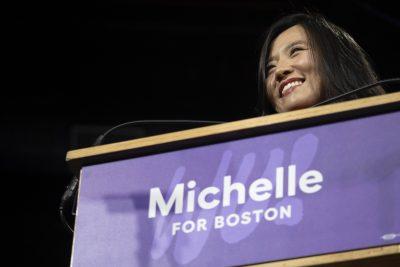Boston’s mayor-elect Michelle Wu, who made history as the first woman and person of color to be elected to the position, will officially take office Tuesday, and students at Boston University expressed their high expectations for her progressive platform.

Issues of particular interest to students include police funding, climate change and homelessness, the last of which has become increasingly relevant given the recent tent evictions and arrests at Boston’s Massachusetts Avenue and Melnea Cass Boulevard intersection earlier this month.
Arsheya Maghsoud, a sophomore in College of Arts and Sciences and president of BU College Republicans, said he is excited to see how Wu approaches tackling racial divides and injustices in Boston, and appreciates how detailed her goals are for the city.
“She has a very clear plan laid out, which, as a Republican, even though I don’t necessarily agree with all the policies and the policies of the politicians that have endorsed her, I think it’s going to be very beneficial for Boston,” Maghsoud said.
Taimah Garratt, a freshman in the College of Communication, said she is hoping Wu enacts more progressive policies.
“It’d be cool to see how she addresses homelessness … that’s personally something that I really am passionate about,” Garratt said. “I would really love to see the homeless population reached out to and maybe something with public transport.”
Wu campaigned on a number of leftist policies, including anti-racist school curricula, closing the racial wealth gap, affordable housing and the creation of a Green New Deal agenda for the City of Boston to address climate change.
When it comes to the pandemic, Garratt said they hope Wu will continue to enforce current health restrictions and ensure Boston doesn’t reopen “too early.”
As activists continue to call on city officials across the country to defund police departments, Maghsoud said he is mainly concerned about how Wu will strike a balance between revising the police department and reallocating their budget.
“She sort of ensures that she’ll deliver structural changes that seek to elevate the transparency and accountability of the Boston Police Department,” he said, “but there’s that ever-present, that ever-looming risk of critically undervaluing and hence underfunding our police department.”
Sergio Aguirre, a freshman in CAS, said they are hopeful that Wu’s climate change policies and her Green New Deal promises are “intersectional and tackle multiple issues.”
“I don’t think it’s just enough to solve one issue,” Aguirre said. “It has to be a culmination of issues that all interconnect.”
Tiya Kothary, a senior in the Questrom School of Business, said Wu’s election to mayor has a personal significance to herself and her identity.
“As a woman of color, I am thrilled,” Kothary said. “I do hope that she represents our community well.”
Aguirre said they see Boston as a racially and ethnically diverse city and believe elected officials should represent that, even though officials have not in the past.
“It’s finally nice to see that the elected official finally represents and reflects the social identities of the people they’re supposed to represent,” Aguirre said.
Jacob Miner, a senior in Sargent College of Health and Rehabilitation Sciences, said he, too, feels it is time Boston is minority-led. And given the city’s early history, he said Wu’s win is almost like a “homecoming.”
“Boston was founded as a city of immigrants,” Miner said. “I think that is a really great and important first step as to getting to the next stage of Boston politics.”























































































































